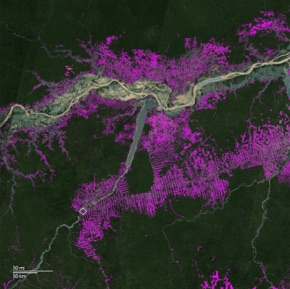The Problem with Wood

Increasing demand for wood drives ever-greater extraction — very often illegal — from dwindling natural forests, as well as increasing conversion of forests to fast wood plantations.
In natural forests, loggers often employ clear-cutting (entirely eliminating all the trees within a large area), wiping out wildlife, scouring ages-old streams and patterns of water movement, degrading ecosystem functions such as under-ground fungal networks on which trees depend. In other places — notably the tropics — the forest is high-graded, whereby the highest-value trees are targeted. In this case, loggers will often kill up to 30 other trees to get at the high-value tree they hunt.
As well, excessive demand of wood products drives conver-sion of natural forests to fast wood plantations, be they southern yellow pine in the Southeast US, non-native eucalyptus in Brazil and Vietnam or radiata pine in Chile.
While the UN definition of “forest” includes monoculture fast wood tree plantations — or even treeless land that is anticipated to be a plantation — if we remove plantations from the UN estimate of deforestation and degradation, the true net loss of forests is increasing cataclysmically.
As with the global food system, greater industrialization and mechanization of the extraction, trade, use and waste of wood has led to vastly increasing demand. This has also led to an ever-greater separation from the wondrous forests and trees from which wood is derived, and with it a loss of hands-on production, crafting and appreciation of trees as living components of the grand ecosystem we call Earth.
If humans and Earth are to survive, we must embrace forests as complex, life-sustaining ecosystems and adopt a Slow Wood® approach to the use of wood.
Amazon tree cover loss around Santarém, Brazil, 2001 – 2018 (in magenta). Source: James Hansen UMD/Google/USGS/NASA, via Global Forest Watch.
Cedar Stump Cemetery — Monuments of a Red Cedar Forest in Washington, circa 1910–1945.
Photo by Darius Kinsey


Slow Wood® is a project of Earthbilt and is a registered trademark. Website copyright © 2021